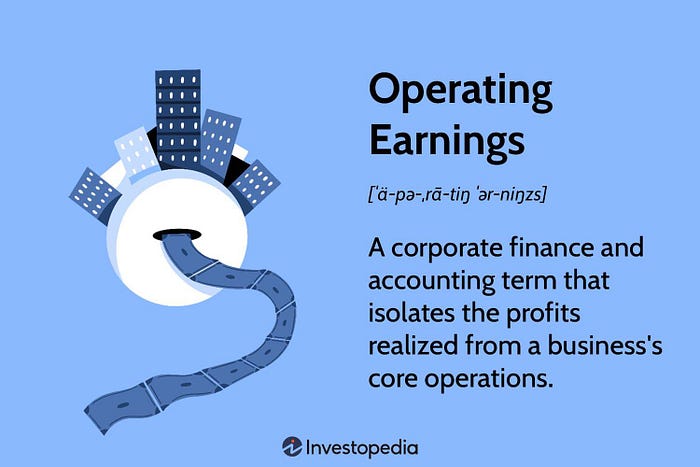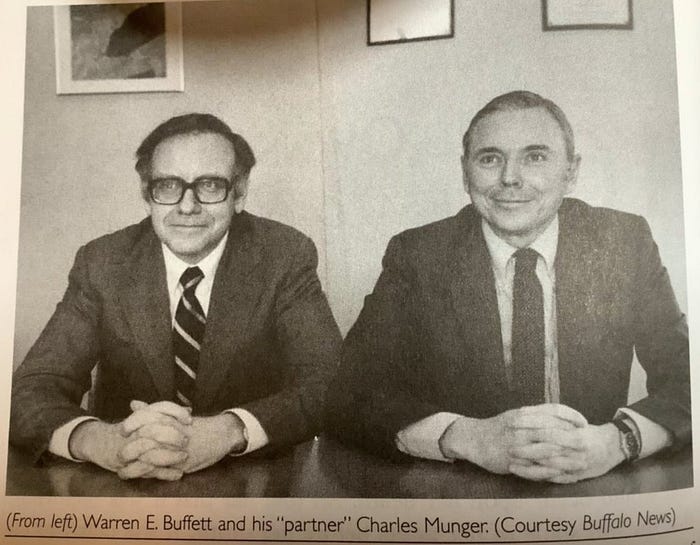What is the fuss?
Mr Buffet diligently writes an annual shareholder letter. This is addressed to all shareholders of Berkshire Hathaway, a USD 900 billion multinational conglomerate holding company owned by Mr Buffet.
His shareholder letters have long been read, line-by-line, by the investor community. They have nuggets of wisdom hidden here and there. And what better way to learn from the investing guru himself.
The humble and thought-provoking writing style of Mr Buffet makes it more interesting to read these letters. And I try to read every one of these.
I share my six investing learnings from Mr Buffet’s 2024 shareholder letter in this post. Let’s get started.
Note: You can read the shareholder letter in full here. This was published on 25 Feb 2024. It is called the 2023 letter by Mr Buffet, summarising Berkshire Hathaway’s performance for the year 2023.
Lesson 1: Focus on Operating Earnings
A company’s earnings tell its growth story and whether it delivers on its strategy. A company’s management often gives future earnings guidance, and investment analysts track this guidance like a hawk, giving stock price forecasts based on this guidance.
When these earnings guidance are met, the stock market cheers, and the stock price might soar. If not, the stock price might tank. In short, a company’s earnings trajectory significantly affects the stock’s performance.
Mr Buffet tells his shareholders to look at the company’s Operating Earnings. This figure shows the profit or loss from the company’s operations in a particular period.

Other figures in a company’s annual report might confuse or conceal facts. Often, Net Earnings are stated by companies, as required by reporting guidelines.
However, net earnings include unrealised capital gains or losses, which can either bloat the net earnings making them look very high, or reduce them to a net loss. Both of these situations give an incorrect picture of the company’s performance. Hence, operating earnings is the more accurate metric to refer to and analyse.
Lesson 2: Good Economics + Trustworthy Managers = Enduring Company
Good economics is the ability to generate excess cash flows, which can be deployed to fuel the company’s future growth.
Companies need money to grow. Acquisitions, investing in people, Research & Development, International Expansion, etc. requires capital. Taking on debt isn’t ideal. But if you have excess cash flow from operations, this can act as a gold mine.
Companies that can consistently generate excess cash flows and even do an average job of deploying them for growth will do far better than companies forced to take on debt.
The second criterion, trustworthy managers, are top management with high integrity. Skills can be learned over time; however, preventing dishonest people from being dishonest is tough.
Mr Buffet places great importance on trust and has a low tolerance for fraud. Even if less efficient, trustworthy managers will ensure company operations run smoothly, and excess capital is deployed carefully.
Mr Buffet calls the ability to deploy additional capital and trustworthy managers the two necessities in picking companies to own. I should emphasise the word ‘necessity’, which indicates that these two are the bare minimum checks a company should pass to be considered for investment. There might be more good-to-have checks, but these two checks are non-negotiable to own enduring businesses that compound your wealth.
Mr Buffet concludes this section of the letter by saying that if the above two necessities are followed diligently over a long period, you will probably make half a dozen good investment decisions, creating disproportionate wealth for you. I couldn’t have agreed more.
Learning 3: Avoid Permanent Loss of Capital
Mr Buffet is known for many apt one-liners and investing wisdom quotes. One of his famous quotes, and my favourite one, is:
There are two rules in investing. Rule 1 is don’t lose money. And Rule 2 is don’t forget Rule 1.
In many of his shareholder letters, he repeatedly emphasises this point. Losing your money not only leads to a permanent loss of capital but also disinterests you from the investment world. And equity investment is a sure-shot way of compounding your wealth one should be always interested and invested in.
Reducing the risk of capital loss is a credible way to earn the trust of your shareholders and a goal of every fund manager out there. Many veteran fund managers call running investment funds managing risk over managing money. You manage risk; you gain trust. You gain trust, you get to manage the money longer, and you earn some good word-of-mouth publicity as well.
Mr Buffet’s business partner, Mr Munger, puts it aptly:
All I Want To Know Is Where I’m Going To Die, So I’ll Never Go There
The criteria for choosing suitable investments to avoid capital loss remain the same. But since investing is a game of emotions, emphasising the downside if you don’t follow a disciplined investing approach is necessary to drive home the point.
Removing risky companies from your search is a good way to narrow down select good companies to start evaluating. Instead of researching all, screening out some, and selecting the remaining, the approach of screening out the majority (risky ones), researching some, and choosing a few might make more sense.
Lesson 4: Reward of Inaction in Investment World
Funny as it might sound at first, this statement is true in every essence of the investment world.
The modern tech advancements cause distraction and noise around stocks, making it hard for your mind to become a patient investor. Repeating Mr Buffet’s words from his 2024 letter, which says this better:
Speed of communication and the wonders of technology facilitate instant worldwide paralysis.
Choosing good businesses, buying them at fair prices, and accumulating them over time during every dip and market crash is a simple and most effective way to compound wealth.
Mr Buffet gives two examples from his portfolio towards this. Coca-Cola and American Express. Berkshire Hathaway did not buy or sell in these two companies in 2023 and sat on them as they have done for the past two decades. These companies rewarded the inaction by an increase in earnings and dividends.
When you find a truly valuable company with a moat, a large addressable market size, and an efficient process to deploy capital, then this company will outperform and outlast many of its peers, even when run by average but honest managers.
Mr Buffet tells his shareholders another way inaction rewards you is by covering up for some bad investment decisions one would have made. Many of us have tracking positions in interesting companies. Some of us invest in companies that go under or face headwinds from which they can’t recover or take many years to recover. In these companies, the loss you make can be more than recovered if you stay inactive in a good company and are, in turn, rewarded by compounding.
Lesson 5: Diversified companies with shareholder-friendly policies are a delight to hold
For a large company to keep growing, it is important to diversify.
Diversifying into related businesses, with synergies or competitive advantages stemming from the primary business, is a good way to keep growing.
Mr Buffet likes large, diversified companies and sees them as a buy-and-forever-hold kind of companies. The only other criteria here is that these large, diversified companies, should also be shareholder friendly.
But what does shareholder-friendly mean? Mr Buffet gives two examples to understand shareholder friendly practises. First, the company creates value for its shareholders by distributing dividends or doing share buybacks at attractive prices.
Second, the actions of top management, even their salary increments relative to earnings and profit growth of the company, reflect shareholder-friendliness.
Mr Buffet gives examples of five such large, diversified, and shareholder-friendly Japanese companies Berkshire holds. These are Itochu, Marubeni, Mitsubishi, Mitsui and Sumitomo. Do note that a subsidiary of the last company is Sumitomo Chemicals, listed on the Indian Stock Exchange.

Illustration taken from finimize.com
Lesson 6: Be Open to Changing Your Investing Strategy
Mr Buffet opened his shareholder letter by remembering the late Charlie Munger, calling him the architect of Berkshire Hathaway, and mentioning how Charlie helped him change his investing style.
Mr Buffet has learned buying fair businesses at wonderful prices from his teacher Ben Graham. He applied this investment strategy diligently, even when purchasing a controlling stake in a textile manufacturer named Berkshire, which later became the $ 900 billion holding company we know today.
Buying fair company at wonderful price means buying an average company, in terms of fundamentals and future growth potential, at deep discounted prices.
However, Mr Munger was quick to point out to Buffet that his decision to buy Berkshire, based on the strategy of buying fair companies at wonderful prices, was dumb. He told Buffet that this strategy works at small scale. However, if Buffet was thinking big, buying wonderful companies at fair prices is the right investment strategy, and then holding them for a long period of time.

Buying wonderful business at fair price means buying a moated business, with good future growth potential, run by honest managers, at a fair valuation.
Over time, Buffet realised the potential of this new investment strategy and switched his investment style, crediting Munger for this.
As a long term investor, it makes sense to be humble enough to accept your mistakes, and more important to learn from them. As time requires, changing your investment style for the better is ok. Clinging on to what worked in the past, or at a small scale, may not be wise. Change is the only constant.
Parting Thoughts
Mr Buffet’s shareholder letters are a treasure of investment lessons, available for free (link to the list of all letters is here).
Long-term investing is rewarding. Being patient and sticking to an investment discipline is key. Investment frameworks may change, or evolve, however certain basics of investing remain the same, and relevant over time.
Staying away from poorly run companies (dishonest management) and finding companies that can efficiently deploy their free cash flows year over year are some basic 101s of investing.
Mr Buffet’s value investing style is easy to read but difficult to master. I like this style, because with a full-time job, I prefer the lazy style of buy and hold good companies. With this approach, it becomes critical to select good companies that are built to last.
Hope you learned something new, or some of your learning got reinforced. Do share what you have learned from Mr Warren Buffet in the comments below, either about investing or life in general.
Happy Investing!




